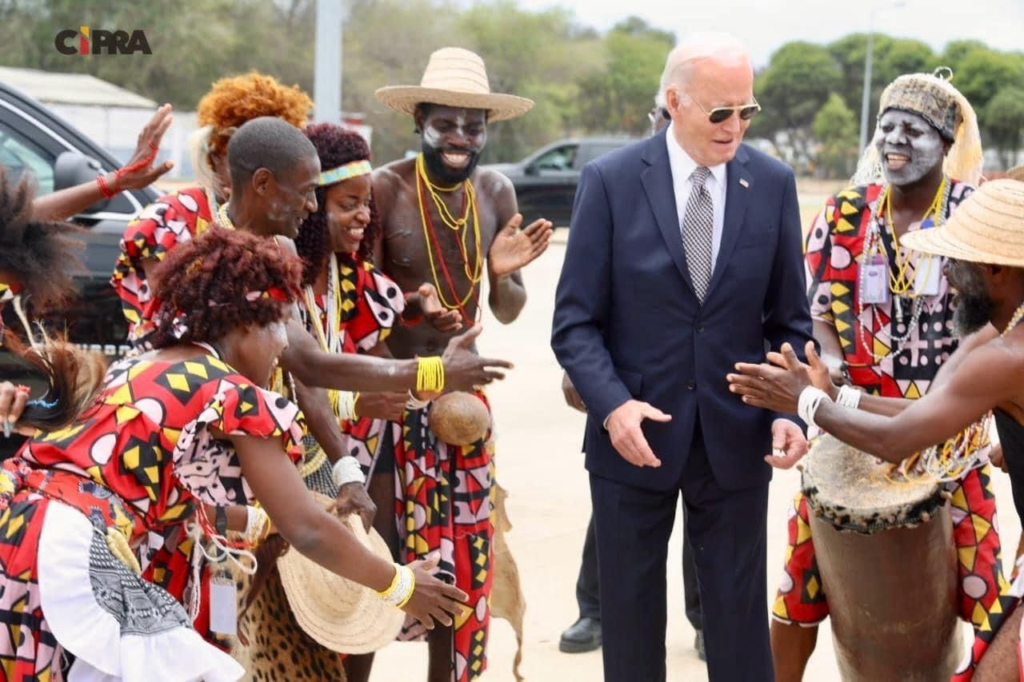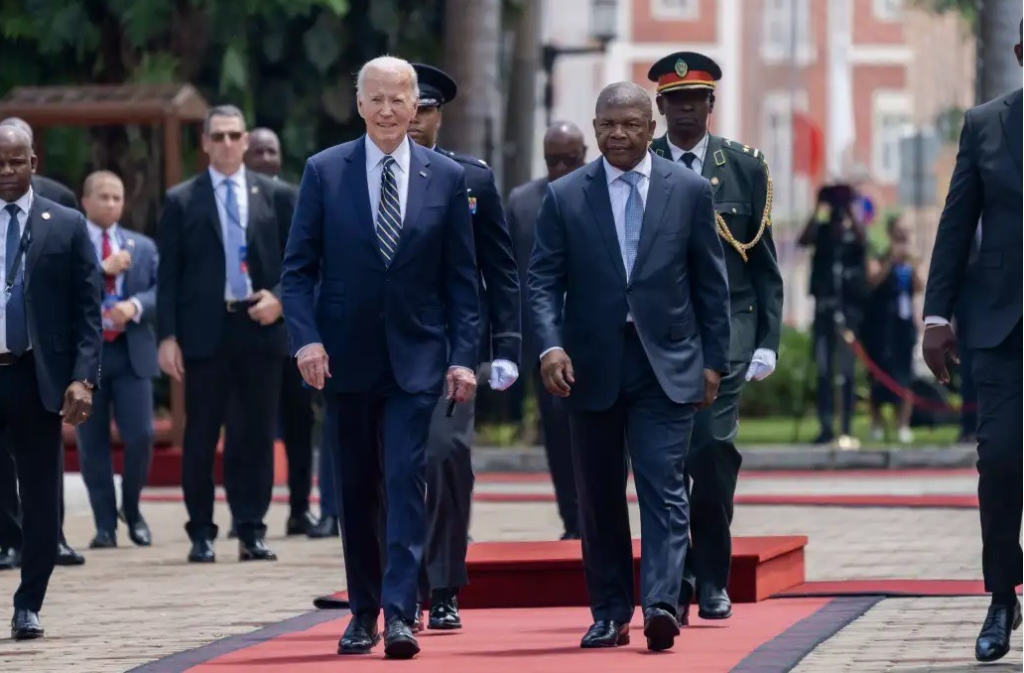President Biden Makes Historic Last-Minute Dash to Africa

In a historic move that has both diplomats and pundits buzzing, President Joe Biden touched down in Angola on December 2, 2024, marking the first visit by a sitting U.S. president to sub-Saharan Africa in nearly a decade. This two-day whirlwind trip, coming just weeks before Biden hands over the reins of power, has sparked intense debate about its timing, significance, and potential impact on US-Africa relations.
A Long-Awaited Promise Fulfilled

Biden’s visit to Angola fulfills a commitment made during the U.S.-Africa Leaders Summit in December 2022, where he pledged to travel to the continent within the following year. The fact that it took 24 months to materialize has not gone unnoticed, with critics questioning the administration’s prioritization of African engagement.
Dr. Christopher Isike, director of the African Centre for the Study of the United States at the University of Pretoria, expressed a sentiment echoed by many across the continent: “While Biden’s visit broadly represents a positive trend in US-Africa relations, that this is happening in the last days of his presidency suggests Africa is not a priority.”
From Cold War Foes to Strategic Partners

The choice of Angola for Biden’s sole African visit is particularly noteworthy given the historical context. Once at odds during the Cold War, the United States and Angola have undergone a remarkable transformation in their relationship. This visit marks a significant milestone, symbolizing the evolution from adversaries to strategic partners.
ALSO READ: Angola Opens New Luanda International Airport
Witney Schneidman, a former U.S. Deputy Assistant Secretary of State for African Affairs, highlights the significance: “The visit will deepen the U.S. relationship with Angola, an increasingly important partner for the U.S. in Africa.” This shift underscores a broader trend in U.S. foreign policy, moving away from Cold War-era alignments and towards more nuanced, mutually beneficial partnerships on the continent.
The Lobito Corridor
Central to Biden’s visit is the spotlight on the Lobito Corridor initiative, a ambitious $3 billion infrastructure project that aims to connect Angola, Zambia, and the Democratic Republic of Congo. This railway project, backed by the U.S., the European Union, and African governments, represents a new model of international cooperation in Africa.
William Tobin, an expert at the Atlantic Council, emphasizes the project’s significance: “The Lobito Corridor shows that the United States can deliver on the right kinds of investment.” This initiative not only promises to boost regional trade and economic development but also serves as a strategic counterbalance to China’s extensive infrastructure investments across Africa.
Geopolitical Chess: U.S., China, and the Scramble for African Resources
Biden’s trip to Angola cannot be viewed in isolation from the broader context of U.S.-China competition in Africa. As Alexander Tripp, another Atlantic Council expert, notes, “The US can outcompete China in Africa—it just needs to do so more frequently.”
China’s economic footprint in Africa has grown exponentially over the past two decades. Since launching the Belt and Road Initiative in 2013, Chinese companies have invested over $12 billion in Angola alone. The China Africa Research Initiative reports that “Chinese FDI flows to Africa have exceeded those from the U.S. since 2013, as U.S. FDI flows have generally been declining since 2010.”
Biden’s visit, therefore, is as much about countering China’s influence as it is about strengthening ties with Angola. The focus on the Lobito Corridor project underscores a shift in U.S. strategy, moving from aid-centric approaches to investment-driven partnerships that align more closely with African development priorities.
The Legacy Question
As Biden’s presidency draws to a close, this visit raises questions about the legacy he hopes to leave regarding US-Africa relations. The trip provides an opportunity to showcase the administration’s Africa strategy, which emphasizes investment over aid and promotes equitable growth through commercial diplomacy.
However, the late timing of the visit has led some to question its potential impact. Fonteh Akum, a prominent African policy analyst, observes: “It comes a little too late with the looming presidential transition likely to lead to a shift in the US’ engagement with African countries at a time when global governance reform is primordial.”
The Delicate Dance of Diplomacy and Human Rights
While the visit aims to strengthen economic and strategic ties, it also brings into focus the complex interplay between diplomacy and human rights concerns. Angola, under President João Lourenço, has made strides in implementing economic reforms and attracting foreign investment. However, human rights organizations have raised concerns about ongoing issues in the country.
Biden’s approach to these concerns will be closely watched. Critics argue that overlooking human rights issues in favor of strategic partnerships could tarnish the administration’s legacy. Zenaida Machado, a researcher at Human Rights Watch, cautions: “While economic cooperation is important, it shouldn’t come at the expense of addressing critical human rights concerns in Angola.”
Confronting the Past, Building the Future
A poignant aspect of Biden’s visit is his acknowledgment of the shared history between the United States and Angola, particularly regarding slavery. During his tour of the National Museum of Slavery in Luanda, Biden spoke of America’s “original sin” and the importance of facing history honestly.
“It’s our duty to face our history. The good, the bad and the ugly,” Biden stated, emphasizing the need for both nations to confront their past while building a shared future. This acknowledgment has been met with mixed reactions, with some praising the candor while others question whether it’s enough to address the long-lasting impacts of historical injustices.
Implications for Broader U.S. Africa Policy
While focused on Angola, Biden’s visit has implications for U.S. policy towards the entire African continent. The trip showcases elements of the administration’s Strategy Toward Sub-Saharan Africa, released in 2022, which aims to “advance shared prosperity, leverage the best of America’s private sector, and promote equitable growth.”
However, experts argue that more comprehensive engagement is needed. As one policy analyst at the Brookings Institution notes, “A single visit, no matter how significant, cannot make up for years of inconsistent engagement. The U.S. needs a sustained, multifaceted approach to Africa that goes beyond periodic high-level visits.”
The Road Ahead: Challenges and Opportunities
As Biden concludes his visit, several key questions loom large:
- Will the momentum generated by this trip translate into sustained engagement with Africa under the next administration?
- How will the U.S. balance its strategic interests with the need to address human rights and governance issues in partner countries?
- Can initiatives like the Lobito Corridor effectively counter China’s extensive infrastructure investments in Africa?
- How will African nations navigate the increasing competition between global powers on the continent?
The answers to these questions will shape the future of US-Africa relations in the years to come.
A New Chapter or a Footnote?
President Biden’s visit to Angola, while historic, represents both an opportunity and a challenge for U.S.-Africa relations. It highlights the potential for deeper, more mutually beneficial partnerships while also underscoring the need for consistent, long-term engagement.
As the sun sets on Biden’s presidency, this African sojourn may well be remembered as a pivotal moment in U.S. foreign policy—a last-minute effort to cement a legacy of renewed engagement with the continent. Whether it marks the beginning of a new era in US-Africa relations or becomes merely a footnote in diplomatic history will depend on the actions that follow, not just in the waning days of the Biden administration but in the years to come.
The stage is set for a potential transformation in how the United States engages with Africa. As Biden departs Angola, he leaves behind not just promises and initiatives, but also expectations—expectations that the world’s most powerful nation will finally give Africa the attention and respect it deserves on the global stage. The coming months and years will reveal whether this visit was truly a turning point or simply another unfulfilled promise in the long and complex history of US-Africa relations.







Responses